- Last Updated: February 16th, 2026
Key Takeaways
Understand specific reasons for filing a Tylenol lawsuit, such as adverse reactions or unlisted side effects.
Collect essential documents like medical records, bills, and photos of injuries.
Seek a lawyer experienced in pharmaceutical lawsuits for guidance and representation.
How to File a Tylenol Lawsuit: A Step-by-Step Guide
Are you tired of feeling like acetaminophen usage has given you more headaches than it’s cured?
Have you considered the potential risks associated with acetaminophen use and the increasing number of acetaminophen lawsuits?
If so, you may want to explore alternatives to generic acetaminophen products.
It might be time to take matters into your own hands and file an acetaminophen or Tylenol lawsuit against the infamous pain reliever.
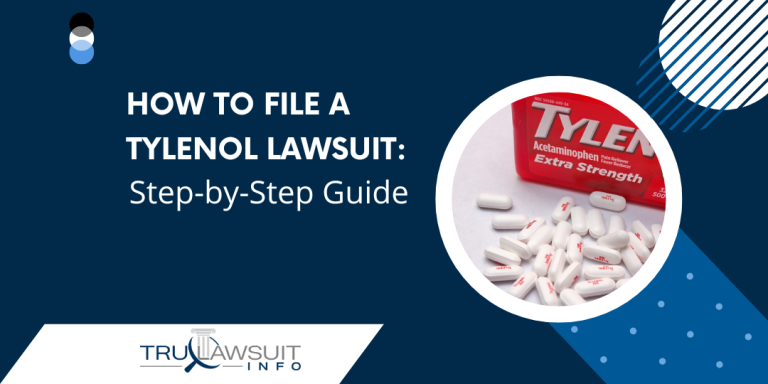
Consider product liability lawsuits and consult with experienced Tylenol autism lawyers.
But before we dive headfirst into this civil lawsuit legal rollercoaster, let’s understand why you would even consider such a drastic step.
It’s important to consult with a law firm for a free consultation to assess the potential risks involved.
Picture this: you’ve been faithfully using the brand acetaminophen, Tylenol, trusting it to alleviate your discomfort.
But what if I told you that there could be potential legal implications lurking behind the use of certain drugs and medications due to the risks associated with them and the responsibility of drug manufacturers?
That’s right!
From mass torts to new class action lawsuits, the world of Tylenol litigation is buzzing with opportunities for justice and compensation for plaintiffs affected by acetaminophen exposure.
So buckle up as we embark on a step-by-step guide to filing a lawsuit against Tylenol for generic acetaminophen exposure.
This litigation guide is designed to help plaintiffs navigate the process.
We’ll explore the reasons behind taking legal action in litigation, shed light on the complexities of civil lawsuits, and reveal how seeking justice can bring relief not just to plaintiffs but also to countless others who have suffered at the hands of this over-the-counter giant.
Our lawyers are experienced in handling mass tort cases.
Eligibility Criteria For Tylenol Lawsuit
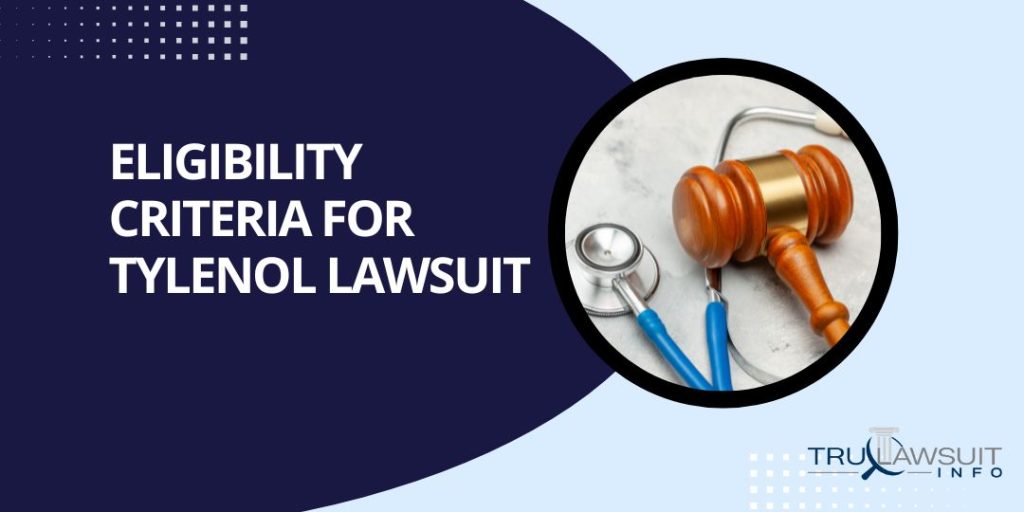
If you believe you have been harmed by acetaminophen use, such as prenatal exposure to Tylenol, and are considering filing a lawsuit for acetaminophen exposure, it is important to determine if you meet the eligibility requirements for plaintiffs involved in acetaminophen litigation.
Here are some key points to consider when assessing your eligibility for litigation involving exposure to Tylenol and autism lawsuits resulting from acetaminophen use.
Determine if you meet the eligibility requirements for filing a lawsuit against Tylenol.
Before proceeding with litigation, it is crucial for plaintiffs and their Tylenol autism lawyers to understand the specific criteria that must be met in order to file a lawsuit against Tylenol for acetaminophen exposure.
While each litigation case may have unique circumstances, there are general eligibility requirements that potential plaintiffs and lawyers should be aware of to determine liability for claims.
Please be aware of the warning associated with acetaminophen use.
Here are general eligibility requirements that potential plaintiffs and lawyers should be aware of :
- Injury or harm: You must have suffered an injury or harm as a result of acetaminophen use or exposure to the drug Tylenol. This may include, but is not limited to physical ailments, such as liver damage or other serious health complications associated with disorders.
- Causal link warning: There should be evidence establishing a causal link between your acetaminophen drug use and the harm you experienced from exposure. It is essential for plaintiffs in autism lawsuits to demonstrate that the use of acetaminophen, a common drug also known as Tylenol, directly caused or significantly contributed to their injuries.
- Timeliness: Plaintiffs and lawyers must be aware of the time limitations for filing cases and submitting motions. Ensure that your claim falls within the statute of limitations for filing autism lawsuits against Tylenol in your jurisdiction.
Acetaminophen plaintiffs should consult with lawyers to determine the appropriate legal action.
Find out if your specific situation qualifies for a Tylenol lawsuit
Not all situations involving acetaminophen usage, such as Tylenol, will qualify for autism lawsuits.
Plaintiffs in these cases must meet specific criteria.
To assess whether your specific circumstances make you eligible for a lawsuit against Tylenol autism, consider the following factors:
- Product liability lawsuits: Evaluate whether there are valid grounds for product liability cases against Tylenol manufacturers due to defects, inadequate warnings, or misrepresentation of risks associated with acetaminophen use by plaintiffs.
- Negligence: Determine if negligence on behalf of Johnson & Johnson (the parent company of Tylenol) played a role in causing your injuries in acetaminophen lawsuits.
Look for cases that may be relevant to your situation as a plaintiff.
Joining a class action suit can provide an opportunity for plaintiffs involved in Tylenol lawsuits to seek compensation collectively with others who have experienced similar harm from exposure.
Consult with an attorney to assess your eligibility and explore legal options.
Navigating the complexities of Tylenol lawsuits can be challenging, especially when dealing with large corporations like Johnson & Johnson.
Plaintiffs involved in Tylenol cases may consider joining a Tylenol class action to seek justice.
A Step-By-Step Guide To Filing A Tylenol Lawsuit
Filing lawsuits against Tylenol for acetaminophen can be a complex and daunting process for plaintiffs in cases.
However, by following a clear roadmap and understanding the necessary documents, deadlines, and timelines involved in cases involving plaintiffs, especially children, you can navigate this legal journey with confidence.
This is especially true in multidistrict litigation (MDL) cases.
In this step-by-step guide, we will walk you through the essential steps required to file a Tylenol lawsuit.
Whether you are a plaintiff seeking justice or part of a class action, this guide will provide valuable information on the process.
Gather Necessary Documents and Forms
Before initiating a lawsuit for Tylenol and ADHD or pregnancy injuries, it is crucial for plaintiffs to gather all the necessary documents and forms required for the MDL lawsuits.
These documents required for the multi-district litigations may include:
- Medical Records: Obtain your medical records that clearly show your use of acetaminophen (Tylenol) during pregnancy and any resulting injuries or adverse effects in order to support your lawsuits as plaintiffs.
- Prescription History: If you were prescribed acetaminophen (Tylenol) by a healthcare professional, collect evidence of your prescription history for potential lawsuits related to pregnancy.
- Keep records of any receipts or invoices proving your purchase of Tylenol products, especially if you have used acetaminophen during pregnancy or given it to your children, as there have been lawsuits related to these cases.
- Acetaminophen Lawsuits: Retain the packaging of the Tylenol product(s) you used as evidence for plaintiffs involved in the MDL.
- Tylenol Lawsuits: If you, as a pregnant plaintiff, have reported any adverse events related to Tylenol usage during pregnancy to the manufacturer or regulatory authorities, make sure to obtain copies of these reports.
Consult with an experienced attorney specializing in pharmaceutical litigation who can guide you through the legal requirements specific to filing lawsuits against Tylenol.
The attorney will help plaintiffs navigate the process and present their case before a judge.
Understand the Timeline and Deadlines
Once you have gathered all the necessary documents, it is vital to understand the timeline and deadlines associated with filing an acetaminophen lawsuit against Tylenol.
This is especially important if you are one of the plaintiffs involved in multidistrict litigation (MDL).
Here are the timeline and deadlines associated with Tylenol lawsuit:
- Statute of Limitations: Each jurisdiction has its own statute of limitations within which plaintiffs must file their claim. It is important to be aware of these limitations as they can affect the judge’s decision to allow the use of the Multidistrict Litigation (MDL) process for your case.
- Pre-Filing Requirements: Some jurisdictions require plaintiffs to fulfill certain pre-filing procedures, such as sending notice letters or participating in mediation, before they can initiate a lawsuit. Familiarize yourself with these requirements to avoid any potential setbacks in using a lawsuit for Tylenol during pregnancy and navigating the MDL process.
- Filing the Complaint: Prepare a complaint outlining your allegations against Tylenol and file it with the appropriate court. This is especially important if you are one of the plaintiffs in an acetaminophen class action lawsuit.
- After filing the complaint: both plaintiffs and defendants engaged in the discovery phase, where evidence is exchanged, and depositions may be taken.
The judge presiding over the multidistrict litigation (MDL) case ensures that both parties use this phase to gather necessary information.
Be prepared to provide additional documentation and cooperate with your attorney during this stage of the judge’s use of the Multidistrict Litigation (MDL) process, especially if your case involves a pregnancy.
Gathering Evidence For Your Tylenol Lawsuit
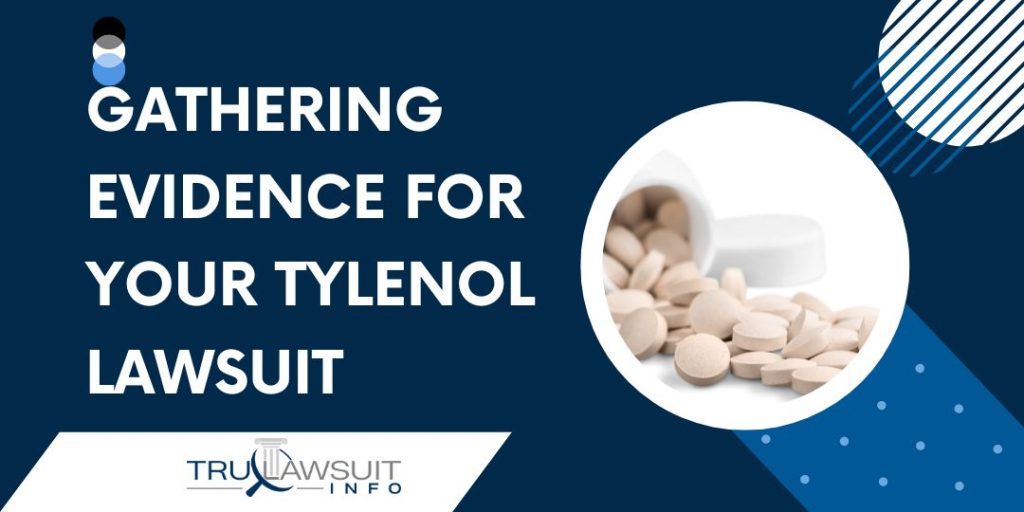
Gathering strong evidence is crucial in supporting your case.
In this step-by-step guide, we will discuss the key points you need to consider when collecting evidence for your acetaminophen autism lawsuits.
Whether you are involved in a judge’s decision or participating in an MDL (multidistrict litigation) or a Tylenol ADHD or autism class action lawsuit, these points will help you gather the necessary evidence.
Collect medical records, prescriptions, and other relevant documentation as evidence.
Once you have identified the key pieces of evidence needed for your pregnancy and autism case, it’s time to collect them diligently.
Make sure to gather all relevant information for your judge and MDL proceedings:
- Contact healthcare providers: Reach out to hospitals, clinics, and doctors who have treated you in connection with your Tylenol use for autism, ADHD, and any related MDL cases. Request copies of medical records that pertain specifically to your condition related to Tylenol, autism, ADHD, and the MDL.
- Obtain prescriptions for Tylenol, autism, and ADHD: Contact pharmacies where you filled prescriptions for acetaminophen or any other related medication. Request copies of these acetaminophen prescriptions for inclusion in your evidentiary documentation for the Tylenol autism multidistrict litigation (MDL) case.
- Gather relevant documentation: Seek out any other relevant documents that can support your case in front of a judge, especially if you are dealing with a multidistrict litigation (MDL) involving autism or ADHD (attention deficit hyperactivity disorder). This may include laboratory test results, X-rays, or any other medical reports that demonstrate the impact of acetaminophen use on your health, including Tylenol autism, MDL, and ADHD.
Consult with experts who can provide professional opinions supporting your claim.
Expert testimony is crucial in strengthening your case against Tylenol, especially when it comes to the potential links between acetaminophen and conditions such as ADHD and autism.
These professionals can provide their specialized knowledge and opinions to support your claims related to autism, ADHD, and the use of Tylenol (acetaminophen).
Understanding The Legal Process In A Tylenol Lawsuit
Familiarize yourself with the different stages of a typical Tylenol lawsuit involving acetaminophen and its potential links to autism and ADHD.
It’s crucial to understand the various stages involved in the legal process, especially when it comes to cases related to autism.
One important factor to consider is the potential link between autism and acetaminophen, commonly known as Tylenol.
Familiarizing yourself with these stages of autism will help you navigate through the complexities of your case involving acetaminophen (Tylenol) more effectively.
Here are some factors to consider:
- Initial consultation: Before initiating any legal action related to acetaminophen or Tylenol autism, it’s advisable to consult with an attorney who specializes in pharmaceutical litigation. During this initial meeting, you can discuss the details of your situation and determine whether you have a valid claim against Tylenol for acetaminophen-related issues, such as autism.
- Drafting and filing the complaint: Once you decide to proceed with the Tylenol autism ADHD lawsuit, your attorney will draft a formal complaint that outlines your allegations against Tylenol, specifically regarding its use of acetaminophen and any potential links to autism. This document regarding the use of Tylenol (acetaminophen) and its potential impact on autism will be filed with the appropriate district court.
- Service of process: After filing the complaint, it is essential to serve copies of it to all relevant parties involved in the case, including those with autism. Typically, this includes delivering copies to Tylenol’s legal representatives or their designated agents for cases involving acetaminophen and autism.
Gain insights into pre-trial procedures, discovery, and settlement negotiations in the context of autism and Tylenol.
In preparation for the autism and Tylenol trial, several pre-trial procedures must take place.
These steps allow both parties involved in the autism and acetaminophen autism lawsuit to gather evidence and build their respective cases involving acetaminophen:
- Autism Discovery: Discovery is a critical phase where each side exchanges information and documents related to the autism case. This may involve interrogatories (written questions) related to autism, requests for production (documents or evidence) concerning autism and Tylenol, depositions (oral testimonies under oath) discussing autism and Tylenol, and expert witness reports on autism and Tylenol.
- Settlement negotiations involving Tylenol and autism: Before proceeding to trial, there is often an opportunity for both parties to engage in settlement negotiations involving acetaminophen. During this stage, attorneys from both sides attempt to reach an agreement that resolves the dispute without going through lengthy court proceedings involving acetaminophen, also known as Tylenol, and its potential link to autism.
Be prepared for court proceedings, including hearings or trials
If settlement negotiations fail or if either party decides to proceed with a trial involving Tylenol and autism, it is essential to be prepared for court proceedings.
This may include but is not limited to:
- Autism Hearings: Throughout the legal process, there may be various hearings where both parties present arguments and evidence before a judge regarding Tylenol and acetaminophen. These hearings can address motions filed by either side or specific issues related to the autism case.
- Trial: In the event that a lawsuit against Tylenol for its use of acetaminophen in relation to autism goes to trial, it will typically take place in a district court.
Updates and Settlements in Tylenol Autism Lawsuit
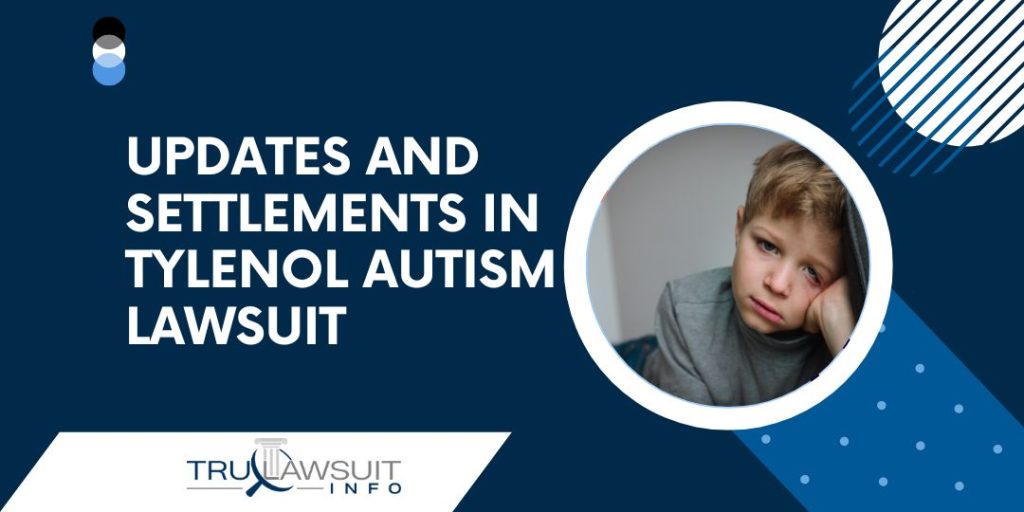
As lawsuits related to autism caused by acetaminophen, also known as Tylenol, continue to make headlines, it is crucial to stay informed about recent updates regarding these legal battles.
Understanding the settlements reached in similar cases involving acetaminophen, such as Tylenol, and autism can also provide valuable insights into how these developments may impact your own potential lawsuit.
Stay informed about recent updates.
Staying updated on the latest news regarding Tylenol autism lawsuits, especially for those considering legal action, is crucial.
It’s important to keep up with the latest information on acetaminophen.
By staying informed about autism, acetaminophen, and Tylenol, you can gain a better understanding of the progress made in these cases and any new information that may emerge.
Regularly checking reliable sources such as news websites, legal blogs, and official court documents will help you stay up-to-date on the latest developments regarding autism, Tylenol, and acetaminophen.
Explore previous settlements
Previous settlements reached in similar cases involving Tylenol and acetaminophen can serve as a valuable reference point when evaluating your own potential lawsuit related to autism.
These settlements often provide an indication of how courts have ruled on similar claims related to autism and can offer insight into the compensation awarded to plaintiffs in cases involving the use of Tylenol.
By exploring past outcomes, you can gauge the likelihood of a favorable resolution for your autism case involving Tylenol and acetaminophen.
Understand the impact on your potential case.
The updates and settlements in Tylenol autism lawsuits involving acetaminophen can significantly impact your own potential case.
They may influence various aspects, such as legal strategies for autism cases, evidence requirements related to autism, or even settlement negotiations involving autism and Tylenol.
For example, if a recent settlement involving acetaminophen resulted in substantial compensation for plaintiffs affected by autism, it could strengthen your bargaining position during negotiations with Tylenol’s legal team.
It’s important to note that each Tylenol autism lawsuit involving acetaminophen is unique, and while updates and settlements provide valuable context, they do not guarantee specific outcomes for individual cases.
However, understanding how these developments have affected other plaintiffs’ claims regarding acetaminophen and Tylenol autism can help shape realistic expectations for your own lawsuit.
Calculating Damages in Your Tylenol Lawsuit
Calculating damages in a lawsuit against Tylenol, an acetaminophen-based medication, can be a complex process, especially when considering the potential link between acetaminophen and autism.
It involves considering various factors such as medical expenses, lost wages, pain, suffering, exposure to acetaminophen, and Tylenol autism.
To accurately assess the damages you may be entitled to in cases related to autism and the use of Tylenol or acetaminophen, it is crucial to seek expert advice from attorneys or financial professionals who specialize in personal injury cases.
Understanding Medical Costs
One of the key components in calculating damages is determining the medical costs associated with your Tylenol lawsuit, specifically related to acetaminophen and its potential connection to autism.
This includes expenses for doctor visits, hospital stays, surgeries, medications such as acetaminophen (Tylenol), rehabilitation programs, and any other necessary treatments for autism.
It is important to gather all relevant medical records and bills related to autism, Tylenol, and acetaminophen as evidence to support your claim for compensation.
Compensation for Lost Wages
If your injury caused by acetaminophen, commonly known as Tylenol, has resulted in missed workdays or an inability to continue working altogether due to complications related to autism, you may be entitled to compensation for lost wages.
This includes not only the income you have already lost but also future earnings that could be affected by your injuries, such as those caused by acetaminophen or Tylenol, which have been linked to autism. ‘
Providing documentation of your employment history and income can help establish the extent of your financial losses, especially if you are seeking support for autism-related expenses.
Evaluating Pain and Suffering
Pain and suffering refer to both physical and emotional distress experienced due to the injuries caused by acetaminophen, commonly known as Tylenol.
This includes injuries related to autism spectrum disorder.
Quantifying damages related to autism caused by Tylenol and acetaminophen can be challenging as they do not have a specific monetary value attached to them.
Factors such as the severity of your injuries, the impact on your daily life, any long-term consequences, and the use of Tylenol (acetaminophen) will be considered when assessing pain and suffering damages in relation to autism.
Seeking Expert Advice
Given the complexity involved in calculating damages for an acetaminophen lawsuit related to autism, it is advisable to consult with experienced Tylenol lawyers or financial professionals who specialize in personal injury cases.
They possess the expertise needed to accurately evaluate all aspects of your autism case, including the potential link between acetaminophen and autism.
These professionals can help determine an appropriate amount of compensation for Tylenol-related cases based on their knowledge of similar cases involving acetaminophen and legal precedents.
Additionally, they can provide guidance for cases related to an autism spectrum disorder.
By seeking expert advice on acetaminophen and autism, you can ensure that your damages related to Tylenol are assessed comprehensively and accurately.
Attorneys and financial professionals will guide you through the process of filing a case related to autism, helping you gather the necessary evidence and presenting a strong case on your behalf.
They are experienced in handling cases involving the use of Tylenol or acetaminophen.
Choosing the Right Attorney for Your Tylenol Lawsuit
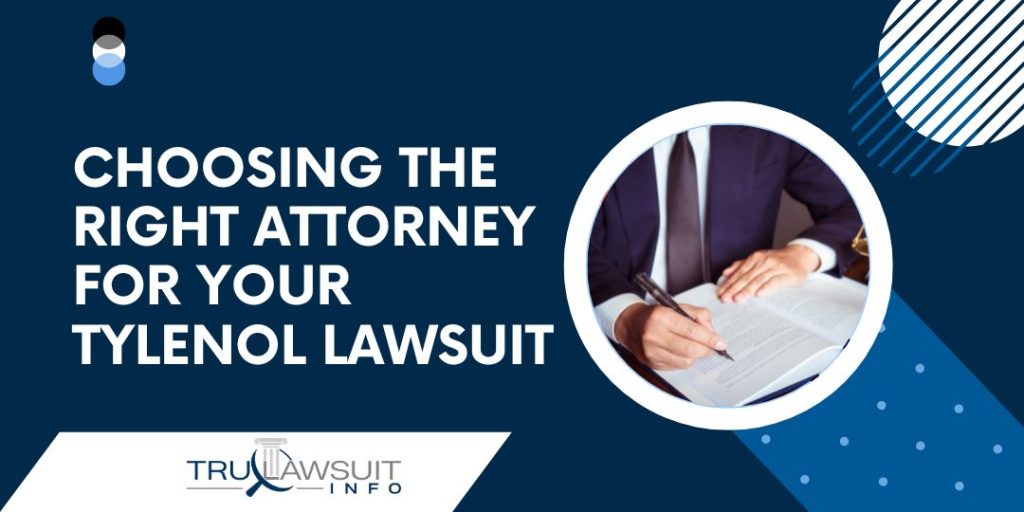
Choosing the right attorney is crucial.
An experienced Tylenol ADHD lawyer can make all the difference in the outcome of your Tylenol or acetaminophen autism case.
Here are some important factors to consider when selecting an attorney for your Tylenol lawsuit involving acetaminophen and its potential link to autism.
Understand the importance of selecting an experienced attorney for your Tylenol lawsuit.
Filing a lawsuit against a pharmaceutical giant like Tylenol, known for its use of acetaminophen, can be complex and challenging, especially in cases related to autism.
It is essential to have an attorney who specializes in handling cases related to defective drugs such as acetaminophen, specifically Tylenol, and has experience dealing with similar legal challenges, including autism cases.
An experienced attorney will understand the intricacies of product liability law and know how to navigate through the legal system on your behalf, whether it involves cases related to acetaminophen or Tylenol autism.
Consider factors such as expertise, track record, and communication style when choosing an attorney.
When evaluating potential attorneys for your Tylenol lawsuit, consider their expertise in product liability law specifically related to pharmaceuticals like acetaminophen.
It is important to find a lawyer who is knowledgeable about the potential link between acetaminophen and autism.
Look for attorneys who have successfully handled similar cases involving Tylenol, acetaminophen, and autism in the past and have a proven track record of securing favorable outcomes for their clients.
Communication is key throughout the litigation process.
Choose a Tylenol lawyer who communicates effectively and keeps you informed about every step of your autism, Tylenol, and acetaminophen case.
You should feel comfortable discussing your concerns and expectations about autism and the use of Tylenol (acetaminophen) with them.
Consult with multiple attorneys before making a final decision.
Before committing to an attorney, it is wise to consult with multiple professionals who have knowledge and experience in areas such as Tylenol, autism, and acetaminophen.
This will give you a broader understanding of different approaches and strategies that attorneys may employ in handling your acetaminophen (Tylenol) lawsuit, particularly in cases related to autism.
During these consultations, ask questions about their experience with acetaminophen lawsuits specifically related to autism.
Inquire about their success rate, settlement negotiation skills, and trial experience with Tylenol, autism, and acetaminophen if necessary.
This will help you assess which attorney specializing in Tylenol, acetaminophen, and autism is best suited to represent you effectively.
Here are some key points to discuss during these consultations about autism and the potential link to Tylenol, also known as acetaminophen:
- Ask about their experience with Tylenol lawsuits.
- Inquire about their success rate in securing favorable outcomes for their clients with autism and whether they have experience with cases involving Tylenol or acetaminophen.
- Discuss their approach to settlement negotiations and how they handle cases related to autism that go to trial, including any considerations for the use of Tylenol.
- Seek clarity on their fees and payment structure.
Important Considerations When Filing a Complaint Against Tylenol
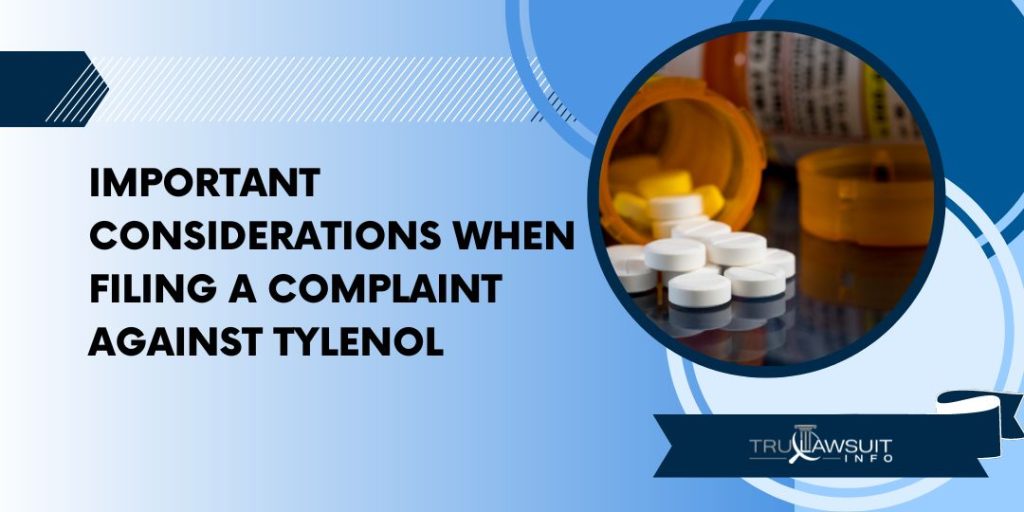
There are several important considerations that you should keep in mind when it comes to autism and the use of acetaminophen, also known as Tylenol.
Understanding the legal requirements and limitations of autism, as well as potential challenges and obstacles related to acetaminophen and Tylenol, can help you navigate through the process more effectively.
Seeking guidance from legal professionals is also crucial to ensure that you can address any complexities that may arise in cases related to autism and the use of Tylenol.
Be aware of legal requirements and limitations when filing a complaint against Tylenol.
Before proceeding with your complaint against Tylenol, it is essential to familiarize yourself with the legal requirements and limitations involved in a lawsuit for Tylenol and autism.
This includes understanding the necessary steps to initiate a lawsuit related to autism and ensuring that you meet all deadlines and jurisdictional requirements.
Failure to comply with these regulations regarding autism and Tylenol could result in your case related to autism or Tylenol being dismissed or delayed.
It is important to be aware of the different types of complaints that can be filed against Tylenol, especially for individuals with autism.
These include master complaints, form complaints, or short-form complaints related to autism and Tylenol.
Each type serves a specific purpose and has its own set of guidelines for submission, including keywords such as autism and Tylenol.
Understand the potential challenges and obstacles that may arise during the process.
Filing a lawsuit against Tylenol for autism may present various challenges and obstacles along the way.
It is vital to anticipate potential roadblocks related to autism and Tylenol so that you can be better prepared to overcome them.
One common challenge involving autism is gathering sufficient evidence to support your complaint about Tylenol.
This may include medical records, expert opinions, or other documentation related to your use of Tylenol or acetaminophen-based medications for autism.
Ensuring that this evidence is properly collected and organized will strengthen your case, especially in cases involving autism and the use of Tylenol.
Another obstacle you might encounter is proving causation between your use of Tylenol and any adverse effects experienced, especially when it comes to autism.
Establishing a clear link between Tylenol and autism requires careful analysis of medical records, scientific studies, warning labels on acetaminophen products, and other relevant information.
Seek guidance from legal professionals to navigate through potential complexities.
Given the potential complexities involved in filing a complaint against Tylenol for autism, seeking guidance from legal professionals is highly recommended.
An experienced attorney can provide valuable advice and assistance throughout the process, including cases involving Tylenol and autism.
A qualified lawyer specializing in Tylenol and autism will help you understand your rights, evaluate the strength of your case, and guide you in pursuing the most appropriate legal action.
They can also assist in gathering evidence related to autism, preparing necessary documents such as a master complaint or short-form complaint for autism cases, and representing your interests during negotiations or court proceedings involving autism and Tylenol.
A Comprehensive Guide to Filing a Tylenol Lawsuit
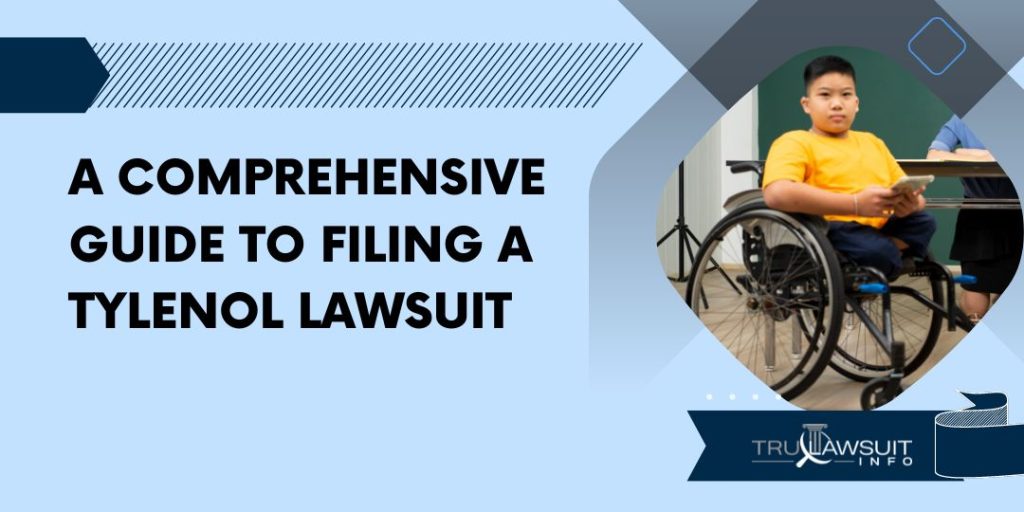
In this comprehensive guide, we will provide you with a step-by-step overview of the entire process involved in filing a lawsuit against Tylenol for autism.
Consolidating all the information provided in previous sections, this guide will serve as a valuable reference throughout your journey toward seeking justice for autism and understanding the potential effects of Tylenol.
Understanding the basics
Before diving into the details of filing a Tylenol lawsuit, it’s important to have a clear understanding of some key terms and concepts related to autism.
Tylenol, also known as acetaminophen, is a widely used over-the-counter pain reliever for individuals with autism.
However, there have been cases where individuals have experienced adverse effects from using Tylenol, particularly in relation to autism.
This has led to mass tort litigation against the Tylenol manufacturer for autism.
Assessing your case
The first step in filing a Tylenol lawsuit related to autism is to assess whether you have grounds for legal action.
You should gather all relevant information about your situation, including medical records and any documented side effects or injuries caused by Tylenol.
It is especially important to consider this if you or a loved one has autism. It may be helpful to consult with an attorney who specializes in Tylenol litigation involving Tylenol and autism to evaluate the strength of your case.
Filing your claim
Once you’ve determined that you have a valid claim against Tylenol, it’s time to file your lawsuit.
The specific steps involved may vary depending on whether your case involving Tylenol falls under state court jurisdiction or federal court jurisdiction.
For state court cases:
- Prepare the necessary documents: This includes drafting a complaint that outlines your allegations against Tylenol.
- File the Tylenol complaint: Submit your completed Tylenol complaint along with any supporting Tylenol documents to the appropriate state court.
- Serve notice: Ensure that Tylenol is properly served notice of the lawsuit according to state laws.
- Await response: After serving notice, you must wait for Tylenol’s response within the specified timeframe.
- Begin discovery: Once both parties are engaged in litigation, discovery allows each side to gather evidence and information to support their case.
- Proceed with the Tylenol lawsuit: Depending on the circumstances, your Tylenol case may go to trial or be resolved through Tylenol settlement negotiations.
For federal court cases:
- Determine if your Tylenol case falls under multidistrict litigation (MDL): MDL consolidates similar Tylenol cases from different jurisdictions into one federal court.
- File a Tylenol plaintiff fact sheet: This document provides detailed information about your Tylenol claim and helps streamline the litigation process in the Tylenol MDL.
Conclusion: A Step-by-Step Guide to Filing a Lawsuit Against Tylenol
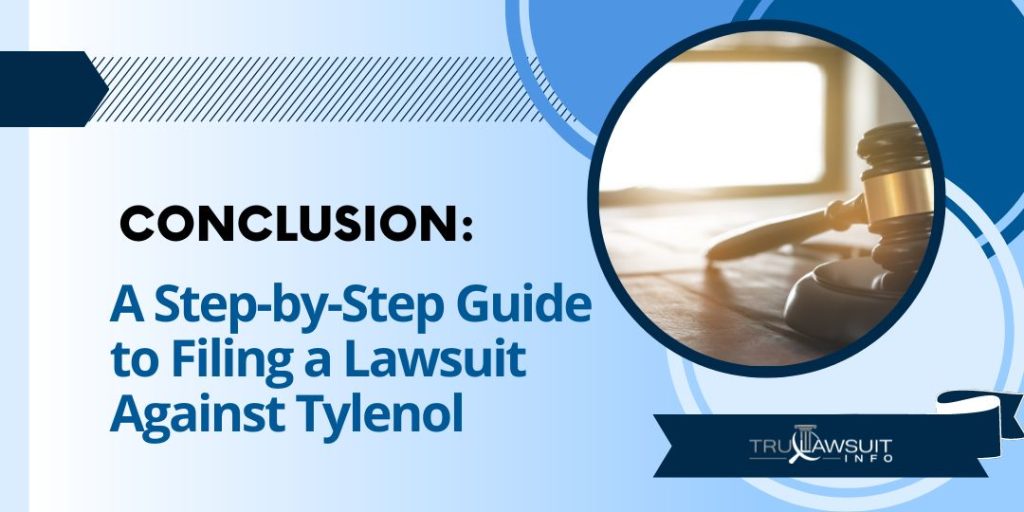
We hope that this step-by-step guide, which includes valuable insights and information about Tylenol, has provided you with the necessary tools to navigate through the legal process involving Tylenol.
Remember, it’s crucial to understand your eligibility criteria, gather strong evidence, and choose the right attorney who specializes in Tylenol cases.
By following the steps outlined in this guide, you are one step closer to seeking justice for any harm caused by Tylenol.
Now that you have a better understanding of how to file a lawsuit against Tylenol, we encourage you to take action if you believe you have been wronged.
Consult with an experienced Tylenol attorney who can assess your Tylenol case and guide you through the legal process.
Remember, time is of the essence when seeking justice for Tylenol-related issues. So don’t delay in seeking the Tylenol justice you deserve.
Frequently Asked Questions
-
If you have suffered adverse side effects from using Tylenol and believe it was due to negligence or defective products, you may be eligible to file a lawsuit against the company.
-
To strengthen your case, it’s important to gather medical records documenting your injuries or adverse reactions related to Tylenol usage.
Any supporting documentation, such as receipts or witness statements, can be beneficial when dealing with issues related to Tylenol.
-
The timeline for reaching a settlement in a Tylenol lawsuit can vary greatly depending on various factors, such as the complexity of the case and negotiations between the parties involved.
It’s best to consult with a Tylenol attorney who can provide a more accurate estimate based on the specifics of your situation.
-
If you believe that Tylenol played a role in your child developing autism, it may be possible to file a lawsuit.
However, it’s important to consult with an attorney who specializes in Tylenol to assess the viability of your case.
-
The amount of compensation awarded in a Tylenol lawsuit will vary depending on factors such as the extent of injuries, medical expenses incurred, and other damages suffered.
An experienced attorney can help evaluate your case and provide an estimate of potential compensation.

Attorney Jessie Paluch, founder of TruLawsuit Info, has over 25 years of experience as a personal injury and mass tort attorney, and previously worked as an international tax attorney at Deloitte. Jessie collaborates with attorneys nationwide — enabling her to share reliable, up-to-date legal information with our readers.
Legally Reviewed
This article has been written and reviewed for legal accuracy and clarity by the team of writers and legal experts at TruLawsuit Info and is as accurate as possible. This content should not be taken as legal advice from an attorney. If you would like to learn more about our owner and experienced injury lawyer, Jessie Paluch, you can do so here.
Fact-Checked
TruLawsuit Info does everything possible to make sure the information in this article is up to date and accurate. If you need specific legal advice about your case, contact our team by using the chat on the bottom of this page. This article should not be taken as advice from an attorney.
You can learn more about the Tylenol Lawsuits by visiting any of our pages listed below:
Here, at Tru Lawsuit Info, we’re committed to helping victims get the justice they deserve.
To do this, we actively work to connect them with attorneys who are experts in litigating cases similar to theirs.
Table of Contents
Tru Lawsuit Info is a reliable source of information about issues that may affect your health and safety, such as faulty products, data breaches, and environmental hazards.
Our team of experienced writers collaborates with medical professionals, lawyers, and advocates to produce informative articles, guides, and other resources that raise awareness of these topics.
Our thorough research provides consumers with access to reliable information and updates on lawsuits happening around the country. We also can connect consumers with attorneys if they need assistance.
Here, at Tru Lawsuit Info, we’re committed to helping victims get the justice they deserve.
To do this, we actively work to connect them with attorneys who are experts in litigating cases similar to theirs.
